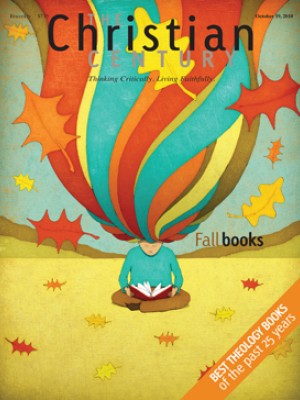Vital theology
Lists of the "best of" are inevitably somewhat arbitrary, reflecting individual views of what "best" might mean. Not surprisingly, the eight theologians we asked to name five essential theology books of the past 25 years came up with very different titles. Only three texts appear in more than one list: Theology and Social Theory, by John Milbank; Race: A Theological Account, by J. Kameron Carter; and Exclusion and Embrace, by Miroslav Volf.
For decades theology in the U.S. has been marked by extreme diversity, a diversity many theologians have explicitly celebrated. Those who proclaim the Christian story as the "master narrative" recognize that that narrative continually needs to be embellished and expanded by those whose own way of telling the story has not been previously heard. This emphasis is well represented in the lists.
Read our latest issue or browse back issues.
Attention to issues of race, class, gender and sexual orientation may be less pronounced now than it was a generation ago, however. Or perhaps it's more accurate to say that this focus is now often joined in imaginative ways with classic theological topics and primary theological sources. Especially apparent in these lists is an interest in recovering the wisdom of pre-Reformation thinkers, affirming the church as the locus for Christian formation and witness, and connecting theology to ethics, worship, sacraments and prayer.
So, for example, Carter's book on race mines resources from the church fathers; Milbank critiques modernity by drawing on premodern Catholic sources; and Volf addresses the horrors of 20th-century ethnic violence by rearticulating a trinitarian spirituality.
Or, to take a few examples from other books on the lists: William Cavanaugh grounds his book on political theology in eucharistic practice; Eugene Rogers's book on gay sexuality focuses on holiness and the Trinity; and Sarah Coakley's consideration of gender issues is marked by references to Nicene doctrine and the practice of prayer.
Over the past 25 years, the classic doctrinal, spiritual and ecclesial traditions have proved to be, as Archbishop of Canterbury Rowan Williams once put it, remarkably hospitable and exciting places for theologians to live, including those eager to reform church and society. That has made the past generation of theology extraordinarily rich—a cause for hope for the discipline and for the church.






